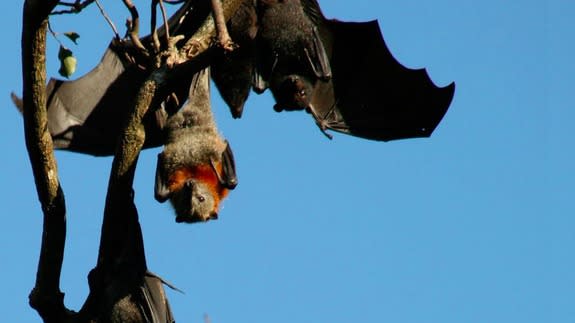The 'super immunity' of bats is good for them, and potentially good for us

For most people, bats are curious creatures that only venture out as we go to sleep, but they are also something of a medical mystery.
The animals are known to carry more than 100 of the world's deadliest diseases, including Ebola and the Middle Eastern Respiratory Syndrome (MERS) virus, but bats don't often seem to suffer their ill effects.
SEE ALSO: CDC investigating 14 cases of Zika virus possibly spread through sex
Scientists at Australia's peak science institution, the CSIRO, have been investigating how bats can live with such a large range of viruses. Their findings were published this week in the science journal, Proceedings of the National Academy of Sciences.
A unique immune system
Michelle Baker, a bat immunologist at CSIRO's Australian Animal Health Laboratory and a co-author of the study, told Mashable Australia scientists had previously speculated bats' ability to handle lethal disease might have have something to do with their immune system.
The team began to look at the innate immunity of bats — one of the defence mechanisms that is initiated immediately after the body responds to a pathogen. Their research focused on the black flying fox, a bat native to Australia that carries diseases including the Hendra virus.

Image: CSIRO
Bats and humans have a group of genes that help the body start to clear an infection during an innate immune response, these are known as interferons. Baker compared interferons to the "chemical hormones of the immune system."
Interestingly, bats appear to have fewer interferons than humans and keep a few of these switched on all the time, even when not infected. This means they have an aways-on frontline of defence against disease.
That's remarkably different from most other animals. "What we do, and every other species that's been looked at, we don't switch interferons on until we're actually infected," she said. "The reason we do that is because they can be quite toxic to tissue and cells ... the flu-like symptoms you get when you're not feeling well ... is partly due to your immune response [and not just the virus]."
"Bats can switch it on without symptoms," she added. In subsequent research, she will investigate on how and why that's the case.
How to live with disease
Eddie Holmes, a professor at Sydney University who has examined pathogens in bats but was not involved with this study, said the research is valuable, but its significance is not yet certain.
"They show very clearly ... that this part of the immune system is different to that in other species," he said. "The question is, and what they can't really show, and not because they didn't do it well but because it's hard to do, is to make the link that this different interferon system is the reason why [bats] have more viruses."
Factors other than interferon activity could also play a role. Holmes pointed out that bats also live together in high numbers. "A very simple rule is that the more dense you are ... the more things you can carry," he said. "As the human population has got bigger and more dense, we carry more and more pathogens ... It's probably a combination of all these different things."
It's not clear how bats developed their interferon response, but Baker suggested it could be due to the fact bats have coevolved with many viruses. "They're quite an ancient group of mammals ... I guess they've had to reach some kind of equilibrium with the virus," he said.

Image: Jesse Hawley/CSIRO
Human impact
While any practical applications are a long way off, Baker said the findings could one day potentially help humans deal with viruses such as Ebola. "If we can learn how bats are skewing their immune response to trigger a particular subset of genes that aren't toxic, then maybe we can trigger a similar response in humans," she said.
Holmes agreed the findings could have significance for human treatment of disease. "Clearly, if bats have immune systems that do allow them to carry more viruses ... knowing [how their] immunity [works] is potentially very important, because potentially we could manipulate that in other species like us. It's a long way down the line," he said.
"If we know how other animals control disease, that's very important for us as well."

